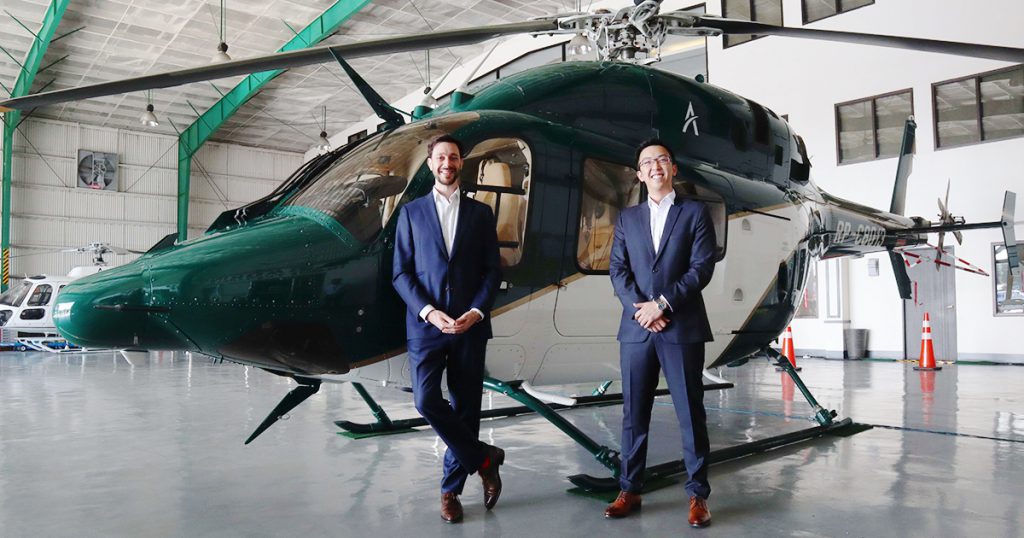In April, we learnt we could be witnessing helicopter taxi trials in Singapore as soon as the end of this year.
German company Volocopter announced it’s cooperating with the Civil Aviation Authority of Singapore (CAAS) to make this happen. They plan to first start with safety tests over water, before proceeding with public trials at its final stage later in 2019.
Another company, Bell Helicopter from the US, has also talked plans to launch their air taxi service in Singapore by 2025.
While these two firms that could become competitors in our airspace made their way over here from foreign lands, we also have a local startup that’s bringing helicopter ride-sharing abroad.
Singapore-based Ascent Urban Air Mobility chose the Philippines as their launch market, rather than to take off on home ground.
Media outlets like Bloomberg and TechInAsia reported on their launch in early April.
We decided to reach out to Ascent’s founders, Darren Tng and Lionel Sinai-Sinelnikoff, to find out why they’re holding out on starting services in Singapore.
Is There Really A Need?
It’s not hard to see why Ascent has chosen the Philippines as a starting ground—the country’s capital city Manila is known for some of the worst traffic jams in the region.
In fact, congestion is so bad that commuters apparently spend 16 days a year stuck in traffic.
For users in the Philippines, the benefits of being able to get out of gridlock are really significant.
Lionel shares that initial customers adopting their services so far have been a mix of business people with time-sensitive needs, leisure passengers, and tourists seeking memorable experiences.

But in Singapore where the traffic is much more bearable compared to other major Southeast Asian cities, air mobility isn’t an urgent need at all.
“In general, for commuters to move to urban air commute, traffic congestion and connectivity within the country needs to be a significant choke point,” Darren explains.
That said, Singapore has a relatively good traffic system.
Instead, he believes other applications of helicopter transport would be more useful here, such as “airport transfers or cross-border routes from Singapore to the closer regions of Indonesia and Malaysia”.
Possibilities For Expansion

In their first month operating, Ascent sold 50 seats on their platform.
They’re currently serving Filipino commuters with 3 active choppers, that can each hold up to 7 passengers and make 30 flights in a day.
According to Bloomberg, the firm hopes to expand to Bangkok, Jakarta and Kuala Lumpur in 2020, followed by some cities in China and Japan in the future.
But this of course depends on how they perform in their pilot market, and Darren says they’re first working to achieve an increase of “activity across the 9 currently listed helipads” in the Philippines.
Some of these include Clark, Tagaytay and Manila, as their locations are key destinations for business travellers and lifestyle-oriented passengers.
He adds that once they achieve some of their short-term and long-term goals (which they decline to reveal at the moment), “expanding within the Philippines and beyond will naturally come after”.
What Would Air Taxi Services Look Like In S’pore?
Although Volocopter and CAAS’s trials will happen later this year, our knowledge of how air taxis will work in Singapore is hazy.
Darren shares that what Ascent currently does in the Philippines is to offer flights at fixed time slots, which are decided based on traffic data and customer demand. They also let people book on-demand flights via concierge.
Like ride-sharing services such as GrabShare, they aim to fill up available seats with a few passengers heading towards similar destinations.
Customers search for time slots and book their flights on Ascent’s website at least 24 hours in advance.

According to Lionel, prices for a seat start at S$200 and vary based on “distance of route and location”.
Surprisingly, this is quite a lot higher than the price points that Bell and Volocopter plan to achieve, as they’ve said they intend for air taxis to be as affordable as hailing a premium car in five to 10 years’ time.
Whether their plans to bring fares down are feasible remains to be seen when air mobility really takes off in Singapore.
However, other factors such as air space regulations, infrastructure, and demand will also affect how things turn out.
While Bell has mentioned hospitals, hotels, and even MRT stations as possible routes and stops, it’s uncertain if land-scarce Singapore can accommodate the necessary helipads in such places to make it work.
To get Singaporeans to adopt the service, companies must not only make it affordable but also convenient and easy to use.
In this case, they could probably follow in the steps of existing ride-hailing firms by offering booking and real-time updates through mobile apps.
Ascent may not be ready to gear up for competition in Singapore anytime soon, but they consider the country a “strategic hub” to manage their operations and carry out business expansion across Asia.
Projecting future possibilities, Lionel says they intend to be a part of the growing urban air mobility scene even when more advanced technology like electric vertical takeoff and landing (eVTOL) vehicles become available.
“We have built Ascent with the future of urban air mobility in mind [and] the advent of new and improved vehicles is something that we have taken into account.”
“[We] strongly believe that through the advancement of eVTOLs, air taxis, not just limited to helicopters, will eventually be significantly more affordable,” he says.
Featured Image Credit: Ascent Urban Air Mobility











